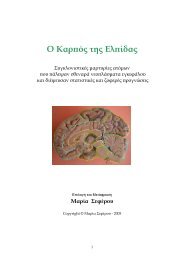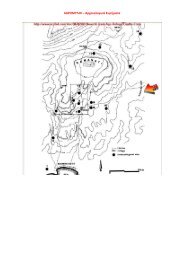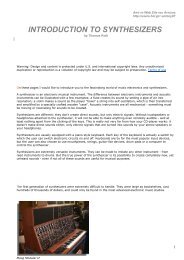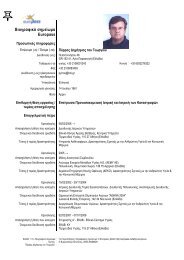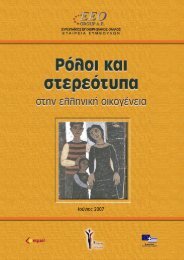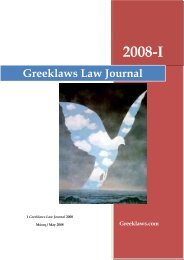BioNews 26 - pdf - Hol.gr
BioNews 26 - pdf - Hol.gr
BioNews 26 - pdf - Hol.gr
Create successful ePaper yourself
Turn your PDF publications into a flip-book with our unique Google optimized e-Paper software.
page 10/Bio News BIO-DIPLOMACY APRIL 2001<br />
INTERNATIONAL COURT OF THE ENVIRONMENT<br />
P<br />
Business and Finance<br />
Constantine Kanonis<br />
President, Hellenic-Russian<br />
Chamber of Commerce, Greece<br />
Would you invest for profit<br />
in the Chernobyl, or<br />
Kozlodoui, nuclear plants?<br />
Would you buy shares in a<br />
company that manufactures<br />
products from depleted uranium?<br />
Would you lend money<br />
to a project that has been sued<br />
for polluting the Danube, or<br />
a good part of the sea and coastline?<br />
Nobody in their right mind would do any of the above, irrespective<br />
of their environmental sensitivities. Therefore, environmental<br />
issues should be taken into consideration when participating<br />
in or financing any project. The environment has been<br />
deteriorating and development is endangered. Our only hope is<br />
that our "bio-awareness" has increased.<br />
Bio-awareness can save the environment and provide development.<br />
Financing is undertaken by banks and international<br />
organisations. If we compare the projects financed that have burdened<br />
substantially the environment to those projects that are<br />
environmentally friendly the conclusion is not encouraging. Today's<br />
global society is neither as civilised as we imagine nor as healthy<br />
as we think.<br />
Economy and ecology have the same prefix: eco. It comes<br />
from the Greek word for "home." Therefore, economy deals with<br />
the laws (nomy) of our home and ecology deals with the logic that<br />
should govern it. Our home, today, is our Earth. I would like to<br />
conclude by stating the obvious: There is no economy and ecology<br />
without life - bios - and there is no life without economy and<br />
ecology.<br />
Bio-diplomacy - defence for life<br />
resent threats to bios are international problems. The<br />
required solutions entail the development plans of action<br />
for peace and international understanding. International<br />
co-operation may lead to a new era for the diplomatic world; the<br />
era of bio-diplomacy. Nations will no longer be at war with each<br />
other but, with environmental destruction and abuse. Foreign<br />
policy may thus shift from a fragmented, competitive framework<br />
to a vision of unity and interdependence.<br />
Bio-diplomacy recognises that cultural differentiation constitutes<br />
the wealth of the body of humanity. Humanity is part of<br />
the overall body of bios, where DNA, the genetic code for every<br />
living organism, is the link connecting all forms of life. Trees, the<br />
source of oxygen on our planet, can be considered the "lungs" of<br />
the body of bios. Damage to the lungs is not an isolated event but<br />
results in the whole body suffering. These unifying concepts are<br />
promoted as the primary consideration of bio-diplomacy which<br />
is involved in enhancing international co-operation in environmental<br />
issues and actively supports efforts to maintain biological and cultural<br />
diversity. At the same time, bio-diplomacy seeks to improve<br />
human relations and attain the goal of world peace by replacing<br />
current diplomatic attitudes with a complete international and<br />
intercultural perspective. Diplomats of all ranks and nations should<br />
be able to appreciate the <strong>gr</strong>eat importance of this task and make<br />
the best possible use of all the levels of power at their disposal.<br />
The pursuit of bio-diplomacy in a co-ordinated fashion, at the<br />
international, national, regional, and local levels, will undoubtedly<br />
provide for increased co-operation among people across all borders<br />
separating them. Especially where issues of "transborder pollution"<br />
are concerned, the need for internationally a<strong>gr</strong>eed upon<br />
preventative policy is crucial. Diplomacy can encourage international<br />
co-operation in environmental protection to enable countries<br />
not only to control, but also to promote the eradication of<br />
environmental deterioration, through international co-operation<br />
and the sharing of experiences and know-how. The role of major<br />
international environmental fora (Rio, Kyoto etc.) can be crucial,<br />
and make a significant contribution to the reversal of global<br />
climate change and the implementation of Agenda 21.<br />
To encourage international co-operation the world needs to<br />
stop investing in war and start investing in the preservation of the<br />
bio-environment. Competition for ways to destroy, should become<br />
co-operation for ways to save. Without interfering with vested<br />
interests, the <strong>gr</strong>eatest challenge for the 21st century should become<br />
the development of new ways of channelling current defence protocols<br />
so as to adopt the principle of defence for bios as the primary<br />
national and international priority. Existing defence equipment<br />
can be amended and used for reforestation, water resource<br />
clean-up, soil erosion recovery, protection of the ozone layer and<br />
the de-contamination of areas affected by nuclear radiation.<br />
A. Vlavianos-Arvanitis. The Bios Theory, 1985.<br />
Anthony Gortzis<br />
President, World Federation<br />
of Advertisers and Director of<br />
Corporate and Media Relations,<br />
Unilever, Greece<br />
In the following decades,<br />
industry will be judged according<br />
to the services it provides<br />
in order to protect the environment.<br />
The truth is that a<br />
lot has been done, and there<br />
is optimism and an effort to achieve a cleaner environment. The<br />
recognition of the importance of the environment is not simply<br />
the result of increased public awareness of such issues. It stems<br />
from a firm conviction that we have a responsibility to contribute<br />
to a better future. This responsibility is a fact. Our own existence<br />
depends on it. If the environment is our world then we ought to<br />
make it better. Industry, as a social unit with structure, organisation<br />
and social responsibility, can play an active role in this effort.<br />
When an industry systematically controls its polluting substances<br />
and monitors waste generation then it can improve profits.<br />
Dr. Harilaos Harakas<br />
Legal Counsel, Federation of Greek Industries, Greece<br />
In our time, an era of transition to a new age when the multifaceted<br />
and complex procedure of globalisation is accelerating at<br />
an extreme rate as a result of the rapid pro<strong>gr</strong>ess made by technology<br />
- in particular, information technology - we can observe irrational<br />
developments in all systems and imbalances between the economy,<br />
politics, culture and values. This rapid and unstable course of<br />
globalisation leads to nightmarish risks for the whole biosystem<br />
and for life in general. Therefore, the idea of an International<br />
Court of the Environment inevitably leads to the suggestion that<br />
the value system of the judicial procedure must be selected and<br />
Panagiotis Koutsikos<br />
President, ERGO S.A., Greece<br />
Âio-Diplomacy<br />
The conference events were attended by the<br />
following Ambassadors and diplomats:<br />
The Ambassadors of Armenia Armen Petrossian,<br />
Great Britain David Madden, Canada David Hutton,<br />
Colombia Manuel Jose Bonett, FYROM Ljunco<br />
Arsouski, Israel Ran Curiel, Italy Agostino Mathis,<br />
Hungary Istvan Pataki, Luxembourg Fernand Kartheiser,<br />
The Netherlands Paul Brouwer, Poland Wojtek<br />
Lamentowicz, Slovakia Milan Dubcek, Slovenia Bornd<br />
Mahnic, Thailand Precha Pitisant, the Apostolic<br />
Nuncio Paul Fouad Tabet, the Diplomatic Representative<br />
of the Palestine Abdullah Abdullah, the<br />
Charge d'Affaires of the Embassy of Brazil Paolo<br />
Roberto Franca, the Scientific Attache of the Chinese<br />
Embassy Mr. Zhang, the Minister Councillor of<br />
the Embassy of Georgia Akoki Lomidze, the Charge<br />
d'Affaires of the Hungarian Embassy Maria Szekelyi,<br />
the Councillor of the Hungarian Embassy Karolyi<br />
Kiss, the Minister Councillor of the Embassy of Indonesia<br />
Bistok Damanik, the Minister Councillor of the Italian<br />
Embassy Mr. Sampoli, the Charge d'Affaires of the<br />
Embassy of the Netherlands Vervloed Jïhannes, the<br />
Minister of the Embassy of Sweden Sven Malmberg<br />
and the Charges d'Affaires of the Embassies of Ukraine<br />
Yevgen Berebyinis and Yugoslavia Goran Alexic.<br />
The presence of so many diplomats at this Biopolitics<br />
conference is an example of bio-diplomacy in<br />
action. Environmental threats do not discriminate<br />
along national boundaries, and global co-operation<br />
in environmental protection is an urgent priority. The<br />
conference resolutions will be promoted in the countries<br />
that were represented, and we hope that, in this<br />
way, the establishment of an International Court of the<br />
Environment will be accelerated and further environmental<br />
destruction will be prevented.<br />
applied appropriately, in order<br />
to enhance older and new values<br />
in the most judicious and democratic<br />
manner. B.I.O. can<br />
encourage the genuinely and<br />
globally represented international<br />
civil society to enter a serious<br />
and intensive participatory<br />
procedure, and that it can bring<br />
about and maintain an international<br />
sense of vigilance.<br />
We cannot allow further<br />
squandering of natural resources.<br />
Governments and people must<br />
realise that the problem of atmospheric,<br />
<strong>gr</strong>ound and water pollution<br />
affects us all. A lot of<br />
money must be spent in order<br />
to remediate and, most importantly,<br />
to prevent environmental<br />
accidents and damage. On the other hand, however, it must become<br />
clear that the cost of protecting the environment should not be considered<br />
solely the responsibility of a certain social sector - such as<br />
the business sector - but should be equally distributed among<br />
social <strong>gr</strong>oups, according to their capacity to bear the financial<br />
burden. It is essential to understand that without a clean and protected<br />
environment, no human endeavour or action will be able<br />
to have long-term potential. There is no place on this planet that<br />
can constitute a safe haven for anyone in the event of serious environmental<br />
de<strong>gr</strong>adation. Pollution and environmental abuse will<br />
sooner or later affect the doers. Nature will take revenge.




